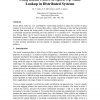Free Online Productivity Tools
i2Speak
i2Symbol
i2OCR
iTex2Img
iWeb2Print
iWeb2Shot
i2Type
iPdf2Split
iPdf2Merge
i2Bopomofo
i2Arabic
i2Style
i2Image
i2PDF
iLatex2Rtf
Sci2ools
CJ
2002
2002
Using Bloom Filters to Speed-up Name Lookup in Distributed Systems
Bloom filters make use of a "probabilistic" hash-coding method to reduce the amount of space required to store a hash set. A Bloom filter offers a trade-off between its size and the probability that the filter returns the wrong result. It does this without storing the entire set, at the cost of occasionally incorrectly answering yes to the question "is x a member of s?". The paper discusses how Bloom filters can be used to speed up name to location resolution process in large scale distributed systems. The approach presented offers trade-offs between performance (the time taken to resolve an object's name to its location) and resource utilisation (the amount of physical memory to store location information and the number of messages exchanged to obtain the object's address).
| Added | 17 Dec 2010 |
| Updated | 17 Dec 2010 |
| Type | Journal |
| Year | 2002 |
| Where | CJ |
| Authors | Mark C. Little, Santosh K. Shrivastava, Neil A. Speirs |
Comments (0)

